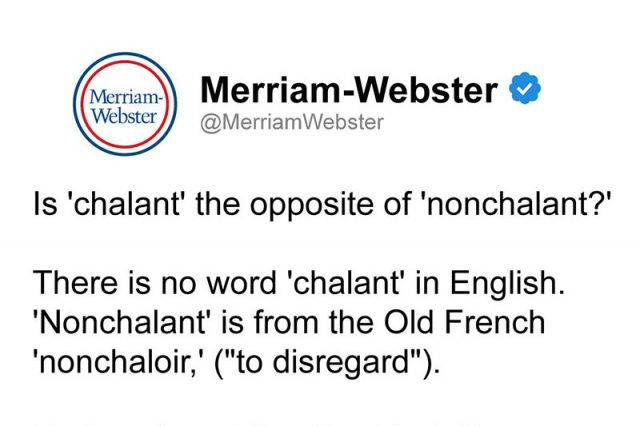A Facebook post of the Merriam-Webster dictionary featuring the word “nonchalant” earned buzz among Filipino online users who use it as an expression in conversation and online posts.
The dictionary answered a question about a certain word on Sunday and said that “chalant” is not its opposite.
“Is ‘chalant’ the opposite of ‘nonchalant?’ There is no word ‘chalant’ in English,” it said in a Facebook post on June 30.
“‘Nonchalant’ is from the Old French ‘nonchaloir,’ (‘to disregard’).
It’s from ‘non-‘ (‘not’) + ‘chaloir’ (‘to concern’). We hope you have an air of easy unconcern or indifference about this,” the dictionary added.
Merriam-Webster also captioned its post with the following text: “We are gruntled about this.”
Its post has earned 6,300 likes and reactions, 2,000 shares and over 140 comments so far, with some Filipinos reacting to the post.
“A Filipino asked that, nonchalant is the word of the year in Philippines,” a Facebook user commented.
“The Filipino global affluence,” another Pinoy wrote.
“Paglaban niyo ‘yung chalant,” commented a different user.
“So ang opposite ng charaught ay noncharaught?” another Filipino quipped, alluding to “charot,” a Filipino expression used at the end of a sentence to indicate that the person is joking.
It remains unknown whether the “chalant” question was actually fielded by a Filipino or the dictionary team as part of its social media content.
The word “nonchalant” emerged as a famous expression among young Filipinos, especially online.
It is usually used with “OA” or overreacting, another term that recently entered Pinoy’s internet jargon.
Examples include “Si nonchalant at si OA.”
In this sentence, “nonchalant” is used to describe a person who is indifferent while “OA” is used to describe someone reacting in an extreme manner.
RELATED: ‘Ano ba ‘yung nonchalant?’: A not-so-nonchalant explainer










